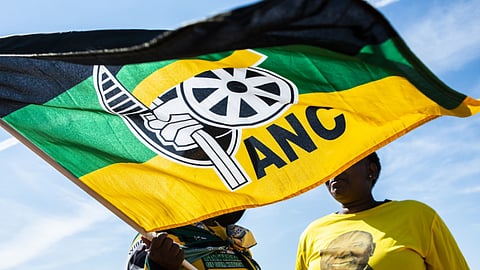Ramaphosa confident that ANC government can tackle debt crisis ahead of crucial election
In the lead-up to South Africa's pivotal May 29 election, President Cyril Ramaphosa asserts confidence in the government's fiscal strategy. Balancing service expenditure and reining in soaring debt, Ramaphosa aims to assuage concerns over economic stability. Amid predictions of the African National Congress losing its long-standing majority, the administration grapples with debt surpassing 72% of GDP. With bold measures like tapping into gold reserves, Ramaphosa navigates the delicate interplay of economic prudence and public service provision.
Sign up for your early morning brew of the BizNews Insider to keep you up to speed with the content that matters. The newsletter will land in your inbox at 5:30am weekdays. Register here.
By S'thembile Cele
South Africa's President Cyril Ramaphosa says he's confident that his government has found the balance between spending on services while reining in the nation's ballooning debt levels.
Ramaphosa was responding to questions from supporters of the ruling African National Congress during a five-day election campaign in the Western Cape province ahead of the May 29 election. Polls predict that the party will lose its outright majority for the first time since coming into power in 1994.
"Through the policies we have executed, particularly this year, we have maintained a fairly good prudent macroeconomic approach to manage our debt while ensuring that we make available resources for services that need to be delivered to our people," Ramaphosa said during a town hall meeting.
The National Treasury opted to tap the nation's gold reserves for the first time this year instead of implementing further budget cuts while also servicing some of the nation's debt. South Africa's debt to GDP stands at around 72% and has skyrocketed over the past decade, in part because of inflation, but also because of wage increases for civil servants. Those hikes account for about a third of state expenditure after rising by an annual average of two percentage points above the inflation rate for the past decade.
"Debt is one of the concerns that we have as a government," Ramaphosa said. "We don't want our debt to balloon to unmanageable levels to a point where we will not be able to deliver services."
The government has had to perform a delicate act with severe budget cuts affecting front-line services such as policing, health and education. The Treasury predicts debt-service costs will decline by 30 billion rand over the medium term as a result of the gold tap. Debt as a share of the overall economy is now seen peaking at 75.3% in 2025-26, down from 77.7% estimated in November.
Finance minister Enoch Godongwana joined Ramaphosa on the campaign trail in the only of South Africa's nine provinces not run by the ANC but by the main opposition, the Democratic Alliance.
Ramaphosa remained bullish about his party's prospects despite a steady decline in electoral support over the past 15 years. He ruled out any talk of needing smaller parties to form a government after May 29 saying that the ANC continued to work toward retaining its majority.
Read also:
© 2024 Bloomberg L.P.

